BEIJING - If business is a jungle where the lion is king, then the wolves are looking to usurp the throne.
At least that's how many Chinese experts see the battle to drive competitive innovation in industry and manufacturing.
While Western executives are learning business acumen from the sixth Century BC Chinese classic, The Art of War by Sun Tzu, Chinese industry leaders are being told to study one of their contemporaries.
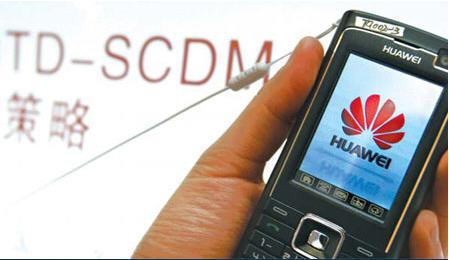
A sample Huawei phone suppoting China's home-grown 3G mobile standard shown in this file photo. [Photo/CFP]
The "wolf culture" of privately-owned Chinese telecommunications giant Huawei is a more visceral strategy for survival than Sun Tzu's analytical tract -- it stresses innovation with the message "Get on top and stay there."
Huawei's founder and CEO Ren Zhengfei has described the wolf spirit as a blend of three qualities: extreme resilience in face of failure, a strong willingness to self-sacrifice, and sharp predator instincts.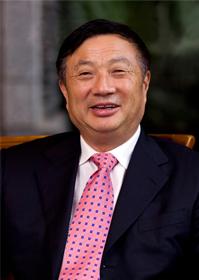
Ren Zhengfei, Huawei's founder and CEO. [Photo/Huawei.com]
"In the battle with lions, wolves have terrifying abilities. With a strong desire to win and no fear of losing, they stick to the goal firmly, making the lions exhausted in every possible way," the media-shy Ren is reported to tell his staff.Ahead of the Pack
In a nation that has been lamenting its lack of innovation, the wolves have been scoring some inspirational successes against the lions recently.
On Thursday, relying on its unique SingleFAN (fiber access network), Huawei was chosen by British Telecom (BT) to provide access products to support its Openreach division in creating a new national fiber network.
In December last year, Tele2 of Sweden and Telenor of Norway picked Huawei to build their shared fourth-generation mobile networks, Long-Term Evolution (LTE), in Sweden ahead of Ericsson and other bidders after the Chinese firm delivered the world's first commercial LTE network in Oslo.
Originally a low-cost manufacturer of products designed by others, Huawei determined to shed its copycat image and move up the value chain when competition at home and abroad intensified in the 1990s.
As an underdog in a market dominated by multi-nationals, it had to prise open its share inch by inch -- and it had to provide better and cost-effective products and services.
To kindle a spirit of innovation, Huawei encouraged its staff to study wolves.
"When you feel real threat of being eliminated by your rivals, the more thirst you will have for designing innovative products," says Chen Naixing, director of the Research Center for Small and Medium-sized Enterprises (SMEs) at the Chinese Academy of Social Sciences (CASS).
Huawei's corporate values reflected in the "wolf culture" set it apart from other Chinese firms, says Chen.
"Facing a lion, wolves cannot afford to wait in fear. The perseverance and confidence that Huawei promotes aims to free its innovators of fear and enhance their confidence," Chen says.
Reclaiming Lost Ground
For thousands of years, Chinese scholars were at the cutting edge of ingenuity -- inventing gunpowder, printing, cast iron, the compass and the chain suspension bridge -- before the torch of innovation seemed to pass to the West in the 1600s.
The failure of China's modern inventors to reclaim their history-making legacy was the subject of debate at the China Internet Conference (CIC) held from Aug 17 to 19 in Beijing.
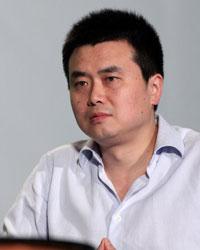
Liu Shuang, CEO of ifeng.com. [Photo/CFP]
"Innovation can start with imitation, but China's technology firms are copying too much, in technologies and business models," said Liu Shuang, CEO of ifeng.com, the online news portal of Hong Kong-based Phoenix TV."I don't think that Chinese people lack imagination and creativity, but they need a special kind of social soil and culture," Liu said.
Zhou Hongren, executive vice chairman of the Advisory Committee for State Informatization under the State Council, the Cabinet, said, "A lack of core technologies is a prominent problem in upgrading China's economy."
Ninety percent of personal computers' CPUs and basic software in China had to be imported, Zhou said at a press conference on Aug 19, quoting a CASS blue paper on China's application of information technology.
In hardware, the record was just as discomforting.
China had to import all of its optical fiber manufacturing facilities, more than 80 percent of integrated circuit manufacturing equipment and 70 percent of digitally controlled machines, said Lai Ming, a member of the Standing Committee of the 11th Chinese People's Political Consultative Conference (CPPCC) National Committee, at a plenary session on June 23.
"A lack of independent innovation is a key obstacle restraining Chinese enterprises' rise up the value chain," said Lai.
Learning to love failure Successful high-tech companies such as Huawei remain rare exceptions in China. For all their determination to become innovators, most Chinese firms struggle to design cutting-edge products comparable to those dreamed up in the West and Japan.
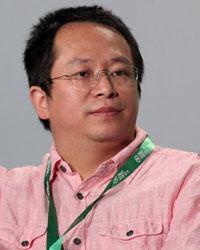
Zhou Hongyi, chairman of Qihu360. [Photo/CFP]
"Innovation means entering an unknown field. You might earn huge success or you might suffer a complete failure. They are equally precious," said Zhou Hongyi, chairman of Qihu360, one of China's leading internet security service providers, during the CIC.In China, it is not uncommon for a researcher to be sidelined by their boss and see their prospects of promotion dwindle if he ends up empty-handed after spending money and time on a research and development project, said Zhou.
"Fear of failure sometimes frightens away potential innovators in China, where the winners get applause and glory and those who fumble have to take responsibility and retreat into obscurity," says Chen.Zhou and Chen recommend enterprises and institutes take a long-term view of researchers' failures and change the generally adopted reward system in which each result is taken as the sole criteria of success.
China's education system also stymied innovation with its discouragement of critical thinking and promotion of conformity as a virtue, says Chen, who would like a system that nurtures critical thinking.
"Only when people are critical of the existing ways of doing things can they have the zest to adjust and devise better ones," he says.
This explains why Huawei incorporated into its core values the concept of "always strive to be the better," he says.
Teamwork was also the foundation of great innovations, says Chen, citing the iPod, iPhone and iPad as examples of organizational innovation.In Huawei, every employee must remember "We can only succeed through teamwork," just as a lone wolf can never beat a lion.
Working for customers In 1988, with 20,000 yuan ($2,942) borrowed from his relatives and friends, 44-year-old ex-serviceman Ren Zhengfei founded Huawei as a distributor of imported exchange switches for a Hong Kong company.
The 2010 Fortune Global list published by the US magazine "Fortune" ranked Huawei at number 397 with annual sales of $21.8 billion and net profits of $2.67 billion in 2009.
Unlike many of its Chinese counterparts, Huawei has a strong commitment to creating long-term value for its customers by being responsive to their needs and requirements.
"We exist to serve customers, whose demand is the driving force behind our development, and we measure our work against how much value we bring to customers, because we can only succeed through our customers' success," Huawei's founder Ren once said.
Forty-six percent of Huawei's 95,000 staff works on R&D, on which the company persistently spends at least 10 percent of its revenues. Even during the economic downturn in 2009, the company increased R&D spending by 27.4 percent from 2008 to 13.34 billion yuan.
With 17 research institutes in the US, Germany, Sweden, Russia, India, and Italy and other countries, mainly employing local engineers, it has also set up more than 20 joint innovation centers with top operators such as Vodafone.
However, most Chinese enterprises are less enthusiastic about innovation.
Big industries, mainly state-owned enterprises (SOEs), have no reason to innovate, as they can achieve huge profits by virtue of their monopoly, says Professor Yao Shujie, head of the School of Contemporary Chinese Studies at the University of Nottingham.
"For SMEs and private businesses, the motivation is there, but most of them have funding shortages partly due to Chinese banks' selective lending approach, which favors SOEs," Yao says.
In 2008, China's large and medium-sized industrial firms (with an annual revenue of more than 30 million yuan) spent 0.84 percent of their revenues on R&D, a sharp contrast with the 5 percent to 10 percent allocated by companies in the West and Japan and the Republic of Korea, the National Bureau of Statistics (NBS) said on Dec 28, 2009.
The NBS's second national economic census in 2009 found only 6.5 percent of industrial enterprises (all SOEs and private firms with annual revenue of more than 5 million yuan) conducted any R&D activities at all.
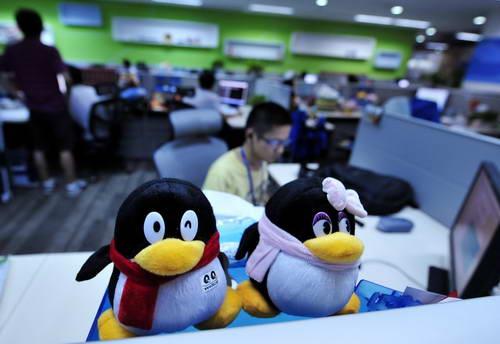
Staffers at work at Tencent's office in Shenzhen, south China's Guangdong province, Aug 20, 2010. [Photo/Xinhua]
Leveling the Playing Field
While the "wolf culture" and the customer commitment can inject innovative spirit into enterprises, the government still has a role in encouraging innovation.
Last week, when Shenzhen was celebrating its 30th anniversary as a special economic zone, the first step in China's market-oriented reforms, the names of Huawei and its rival, ZTE, the world's third largest internet firm Tencent, and one of the world's leading electric car and battery makers BYD, were celebrated in local and national media.
It is no coincidence that these innovative champions are located in Shenzhen, says Ni Pengfei, director of the Research Center For City and Competitiveness at the CASS.
"The government of Shenzhen encourages enterprises to take center stage in innovation by being single-focused on creating a level playing field for all kinds of companies, big or small, private or state-owned," Ni says.
The fair and open market system of Shenzhen forces SOEs to innovate under real threat from competitors and ensures SMEs have the funds and the confidence to invest in R&D, he says.
"Each innovation of Huawei is a direct product of market," says Ni. "The government should focus on its role of ensuring all players do business on an equal footing and the winners are selected by the market and customers."





